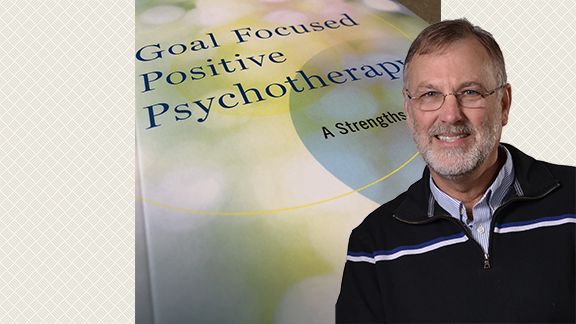
Scheel's new book describes groundbreaking psychotherapy approach
23 Jan 2018 By Brad Stauffer
Focusing on strengths rather than problems is a more effective way for psychotherapists to help their clients find happiness and diminish feelings of distress, says Mike Scheel, professor of educational psychology at the University of Nebraska–Lincoln. With colleague Collie Conoley, Scheel has written a new book describing a unique therapeutic process that takes positive psychology to a paradigm-shifting level.
“Goal Focused Positive Psychotherapy” (Oxford University Press, 2018), is a groundbreaking approach to psychotherapy that diverges from typical methods that rely on a physical science model or medical model for change. That traditional approach is based on identifying the problem then working on a treatment solution. Alternatively, Goal Focused Positive Psychotherapy (GFPP) uses positive psychology approaches that first look at the client’s personal strengths and builds their well-being from that perspective.
“We believe our approach is more ethical, and we think it’s more ethical because clients benefit from it more because it fits with them and they’re more willing to try out what we’re offering,” says Scheel. “It’s the first comprehensive model of therapy that fully integrates the field of positive psychology.”
GFPP is built on four processes: 1) the identification and enhancement of client strengths, 2) the promotion of positive emotions, 3) the formation of approach goals, and 4) engendering hope. Scheel says these processes are highly teachable for therapists and allow them to “build an alliance” with clients. That working alliance is the number one factor that predicts positive change, he says.
“It’s a shift in mindset,” suggests Scheel. “Instead of working on problems, it’s a shift to helping the client be happier and healthier in their life. Indirectly, problems are resolved, or at least the client is better equipped to be able to deal with their problems.”
Scheel and Conoley embrace the “broaden and build” theory of emotions made popular by psychologist Barbara Fredrickson. “When people experience positive emotions, happiness, pride, contentment or interest, they broaden,” says Scheel. “It’s when they’re at their best. They’re interested in looking at the world in a different way, trying new things, exploring. They’re broadened to all kinds of experiences, and that’s really at the crux of both the GFPP approach and the theory of broaden and build.”
Approach goals are a more positive strategy than avoidance goals that are often used in therapy. The focus is on what the client wants rather than on what they don’t want. Along with instilling hope, these positive approaches have proven to be a nice model to use with high school students.
While developing the GFPP model, Scheel’s research has included working with students at Lincoln Northeast High School for the past 12 years and Lincoln High for three years. With help from UNL colleagues Kathy Rudasill, John Maag and Sue Kemp, Lincoln High students are being introduced to GFPP. Teachers are being trained to teach some of the concepts around identifying strengths and celebrating positive success and emotion—especially with hard-to-reach students.
“Kids don’t want to fail in school,” said Scheel. “They don’t want the teacher to be mad at them. They don’t want to get in trouble. That’s the avoidance goal. So, what do you want instead? ‘I want to be a successful student,’ would be an approach goal. We work with them on that.”
The Scheel and Conoley book, Goal Focused Positive Psychotherapy: A Strengths-Based Approach, is available at Oxford University Press, Amazon.com, Barnes & Noble and other booksellers.
College of Education and Human Sciences
Educational Psychology